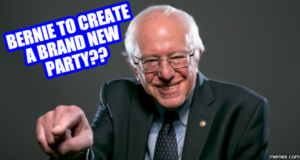Feb 17, 2017
(This is the transcript of Redacted Tonight VIP #47, featuring Lee Camp’s interview with Nick Brana. Transcribed by C. Hayes.)
Lee: Welcome to Redacted Tonight VIP. I’m Lee Camp. Tonight I spend the whole episode with Bernie Sanders’ former National Political Outreach Coordinator, Nick Brana. He was inside the Sanders campaign for most of the run, and was a founding member of the political action organization, Our Revolution. Now, he’d like to draft Bernie into a brand new People’s Party, a brand new party they want to create. Could it happen, or is it just a pipe dream? That, I’ll get to the bottom of. In this interview, I got answers to so many questions I’ve had, like – Why did Bernie endorse Hillary? Why did he do that? And why didn’t his campaign talk more about the blatant election fraud so many of us were screaming about?
Well, Nick has the answers. By the way, in the interview I accidentally called him Bernie’s “Political Outreach Director.” He’s Bernie’s Political Outreach Coordinator. Just wanted to get that right.
Okay. Here’s my interview earlier today with Nick Brana,
Lee: Nick, thanks for joining me.
Nick: Happy to be here, Lee.
Lee: So, I want to spend most of the time on your new campaign to draft Bernie to a new party, but before we get to that, you’re the first insider from the Bernie campaign that I’ve had on the show. Why did he endorse Hillary? Why, Nick, why!
Nick: I was asking myself the same question! I think that – you know, at the time this was a really unpopular position, and you know, people were, like, are you [censored] crazy? So I thought that if he joined Jill on the ticket, that he would be president right now. And lot of people have come around to that position —
Lee And Jill opened up the party, and said, “You can join us, you will be the head of the ticket.” Well, what do you think was the reasoning? I’m not saying you necessarily know, just your feeling about it.
Nick He didn’t want to be responsible for electing Trump. So that’s the spoiler effect in our electoral system, which leads you to vote strategically. And he didn’t want to be responsible for that. So that was the reasoning.
Lee: I think Bernie may be one of the least politician-style politicians we’ve had, but there is some politician there. There is some angling for what’s coming down the pike in the future. And I don’t mean he was angling for his own position! I think he blew that away by going against Hillary. He wasn’t clearly trying to be accepted by the general Democratic party. But, like you said, he was worried about a Trump presidency – which, if only more people had been worried about that, maybe they would have not put their thumb on the scale!
Nick: I think if all the people who are protesting Trump now had activated before to elect Bernie, then we wouldn’t be in this mess, either. But, the system was so rigged, too, the election.
Lee: That’s another question I want to ask. You see the way that that primary was rigged on every level: in terms of voter suppression; in terms of polling places being closed; you know, the 100,000 that were wiped off the rolls in Brooklyn alone; the audit of the Chicago machines, which clearly showed, at least, that the machines were flawed, not necessarily rigged, but flawed; and the Board of Elections didn’t care at all. So you just see it here, and here and here and here. Why did we not hear more out of the Bernie campaign talking about that, bringing it to people’s attention, you know, yelling it from the hills?
Nick: Yeah. So, the “sore loser” argument was something that was so effective against the campaign. There were a lot of people within the campaign who simply did not want to open themselves up to that. They thought, well, it would cost us more delegates down the road to start seeming like, you know, we’re whining and challenging these won results or we’re fighting for a little handful of delegates here and it’s going to be such a distraction over what we’re trying to win down the road. So I think that’s why. Part of the reason that I don’t think the party’s good enough anymore is that they haven’t taken any responsibility for that. The party is now – the party is still led by someone who actively rigged the primary: Donna Brazile, who replaced Debbie Wasserman Schultz, who was kicked out of her position for rigging the primary!
Lee: And was leaking questions to the Hillary campaign from the debates. And my favorite thing was this lawsuit in Florida against the DNC, where the DNC lawyers, said, “Well, the people who donated to the DNC who were Bernie supporters, they should have known we were going to rig it.” Basically, they admitted it in court. They said, “Look, they knew that we were in bed with Hillary, so therefore we did nothing wrong!”
Nick: So a lot of my work on the campaign revolved around lobbying the superdelegates for Bernie.
Lee: Yeah, I wanted to ask you about that, too.
Nick: One thing that I walked away with — I walked away with several conclusions. One of them is that they weren’t concerned with the issues. They were actually annoyed when I tried to talk to them about the issues.
Lee: So what was it that made them – I mean, they almost all came down on the side of Hillary.
Nick: They did. A hundred of them came down before we even launched the campaign.
Lee: We did a big thing on Redacted trying to remind everyone that the superdelegates don’t vote until July 25th, until the Convention, even though the media was acting like it was done and signed, sealed, delivered. Why was it that the superdelegates, if they didn’t care about the issues, what was it that they cared about so much that they all got in bed with Hillary?
Nick: All of them were concerned, essentially, with their own professional advancement. And of course there were exceptions. But the generality was that, ooh, they didn’t want to go against the machine. The machine had a direction and they didn’t want to oppose it. Some of them were even scared to talk to us. Because they were afraid they would end up on some Hillary blacklist. That’s how incredibly oppressive the party was towards the superdelegates. It’s worth saying too, that the superdelegates were created in the ‘80s explicitly to overturn the results if the people got any funny ideas about electing a progressive (in their minds).
Lee: It’s basically, they learned what happened after Jimmy Carter, and they were, like, none of this!
Nick: And George McGovern. That’s right. And so they looked at those two. And they said, “You know what? I think the that party should be choosing the candidates instead.” They had opened up the primary process a little bit. And then they went back on that by introducing the superdelegates. And the superdelegates, would have — I’ll tell you right now — if Bernie had won the popular vote, they would have reversed it. They would have reversed it, hands down.
Lee: Meaning that even if he had won the popular vote, they still would have made Hillary the nominee. That’s what you’re saying.
Nick: Yeah. Yeah, unquestionably. They were created to do that. And they would have gleefully fulfilled that mission.
Lee: And the Republicans, during Trump’s rise, wished they had superdelegates, and in fact, a couple of them said on television, “We wish we had these superdelegates to make sure the popular vote didn’t matter that much.”
Nick That’s such a great point, Lee, because the Democratic primary is less democratic than the Republican primary, because of the superdelegates. Because of the superdelegates, it was possible for a nominee to get 30% percent of the weight of the nomination before a single person had cast a vote! Each one of those superdelegates was worth 10,000 votes.
Lee: Right. And I had posted something a year before, or whatever, saying, right when it came out that Bernie was behind Hillary, a year in advance, “This is why Hillary will win. She already has this percentage of the vote locked up with superdelegates.” And people got angry with me. They were like, “Oh, you’re trying to make it so that people won’t vote!” And I’m like, “No, I’m just telling you the reality of the situation.”
Nick: And they haven’t cast a vote, but it affects the media narrative. Another thing that infuriated us on the campaign was that the media made no distinction between regular delegates (people voting) and superdelegates. They just lazily lumped these two things together. So it made it look like Hillary had this immense advantage. For example, if you googled, the status of the delegate race in the Democratic primary, you would see the pledged delegates, which were the popular vote delegates, and then on top of that you would see the superdelegates. And so it was this huge artificial advantage.
Lee: This is just a normal google search. This is not meant to be a biased view of the election. But just google, “who’s winning the Democratic primary?” It would show you the superdelegates as if they had already voted on the bar graph.
Nick: We’ll never know how many thousands or even millions of people who said “You know what? I think this Bernie guy’s talking a lot of sense! Let’s see what he’s up to — oh, he doesn’t stand a chance!”
Lee: “He doesn’t stand a chance,” or, “I’d like to back a winner. She’s winning.”
Nick: Yeah. That kind of thing.
Lee: And it drives me nuts that after the election, people stop caring about these things, when in fact, now’s the time to change the system. Now’s the time to be upset and say, “Superdelegates do not represent us, and so for the next time, we’re not going to allow superdelegates to control this election. Or, for example, the voting machines!” Now it the time to say, “Hey, we can’t even check the code to know what’s going on in these machines. We don’t want that next time!” Instead everyone’s just like, “Oh, well, let’s just move on with our lives.”
Nick: It’s insane.
Lee: It’s absolutely crazy. Our Revolution, which you also helped found. You were one of the higher-ups. It is a political action organization founded after Bernie endorsed Hillary, to stand up for these important issues, all the things that Bernie said. You were there for a little while and then you left. What went on there?
Nick: That’s right. So we had secured a promise from Bernie, a number of us, that Jeff would not be a part of the organization.
Lee: Jeff Weaver. He also ran Bernie’s campaign.
Nick: Jeff Weaver, who was campaign manager and is now president of Our Revolution. And the reason we didn’t want him to be part of the organization he had suggested this plan whereby billionaire donors would be able to donate to Our Revolution and also had set up the organization in a way that it would be able to accept those donations anonymously. I found that, and a number of us found that, just incredibly offensive. The idea that we’d just run a campaign opposing billionaires and opposing that logic, and that now, when we were creating the successor organization, this incredibly powerful successor organization, that we would kind of reverse on that and start taking money from the billionaires that he had opposed and the grassroots, but even more offensively, the idea of taking that money without informing the grassroots.
Lee: Yeah. It’s almost like taking a sledgehammer to the tent-pole issue of Bernie’s campaign.
Nick: Yes, that was what motivated my resignation. This was one of the conversations that we had at Our Revolution: Can we run a successful operation without that money? And the answer is that we can. That’s what Bernie’s campaign taught us! And so the establishment is just trying to erode those lessons that we learned from the campaign, about how, no, we actually don’t need their money. And there comes a point when actually, the system is so skewed and people are so infuriated, that that power begins to outweigh their money. And we’re there now.
Lee: Yeah. And people don’t realize how corrupting – some people don’t realize – how corrupting the influence is. If you have Our Revolution and it’s backed by billionaires, those billionaires, maybe at first they’re hands-off, but eventually, if something is standing against — “Hey, I’m going to pull my millions, you’re going to stop getting that money,” and the organization’s like, “Well we can move that way a little, because we will need those millions coming in.” It makes them incredibly powerful in an organization, in a politician’s campaign, whatever.
Nick: It does. Because once you start taking that money – you can’t have both. You can’t have the billionaire money and the grassroots money that Bernie brought in on the campaign. Once you start bringing that money in, you compromise your principles. You start losing the grassroots money. And then what happens, you become dependent on the billionaire money, because it makes a larger share of your donations, so once again — and it’s a cycle that leads you down an establishment path with establishment logic. And Bernie’s organization didn’t have to do that, because it had this incredible power of being able to be a grassroots-funded organization.
The good news, Lee, that I want to add though, is that since then they have — our efforts were successful in the end.
Lee: They don’t take that money anymore?
Nick: They are going to be transparent about their donations. And they will not take large donations without any approvals by the Board.
Lee: Well, that’s a step in the right direction. All right, so let’s get to the Democrats now, where they are now. They’re supposed to be the resistance against the Trump agenda, and you know, you have them doing things like approving his Defense Secretary 98 to 1 in the Senate. There are 14 Democrats that have voted for every Trump nominee, Tim Kaine being one of them. Mr. former VP candidate is apparently in a contest to see who can tickle Trump’s balls the most. It’s amazing. So those are our Democrats. They’re supposed to be the resistance! What the [censored] are they doing?
Nick They’re doing what they’ve always done, Lee. They’re doing what they’ve always done. That’s right. The Democrats, as the left-wing party in this country, the onus is supposed to fall on them to represent working people, to represent labor unions, but they gave up that alliance with labor that FDR formed, that alliance from the New Deal. They gave that up in the 70’s. And ever since then, through Bill Clinton’s new Democrats, they’ve instead embraced the same alliance with corporations that Republicans have. So you literally see politicians who are competing against each other — in every presidential election, for example, the contributors are the exact same banks. The exact same corporations. The exact same individuals.
Lee: And then when they surround themselves – in order to create an economic team that’s going to tell them how to run the economy, it’s Goldman Sachs and Goldman Sachs and maybe you’ll throw in a little CitiBank and then it’s Goldman Sachs and Goldman Sachs, and, oh you look at Donald Trump, and oh, it’s Goldman Sachs and Goldman Sachs! How are these two separate parties?
Nick: It’s not exactly. It’s not even accurate to refer to them as two different parties. Noam Chomsky and Gore Vidal and a number of people have noted that. It’s actually one party. Gore Vidal would say, it was one corporate party with two right wings, and he called it “the Property Party.” And I think that’s completely accurate because the Republican Party would not be able to do what it does, including getting all the way to Trump, without facilitation — willing facilitation — by the Democrats. By the fact that Obama did not actually fulfill any of his campaign promises, did not go forward on that. By the fact that the Party keeps blocking progressives. The fact that the Democratic Party’s never fulfilling that populist goal and mandate that it claims during campaigns, is the reason that it keeps losing, and that people get so desperate that they go to —
Lee: This brings us to a good point. You’ve got a plan to fix this. We’re going to get to that in the second half of the show. We’re going to go to a quick break, but we will be right back to learn: what is the plan to save the Democrats?
* * * * *
Lee: Welcome back to Redacted Tonight VIP. I’m here with Nick Brana, the former Political Outreach Director for Bernie Sanders campaign and now the founder of the effort to draft Bernie for a people’s party. So basically there’s two ways the Democrats could go right now, it seems, and not be completely sold out to corporations. One is being put forward by Cenk Uygur and the Young Turks and some former Bernie staff as well, called Justice Democrats, where they say it is within the umbrella of the Democratic Party, but it’s “no corporate money.” That’s the claim. So they’re trying to take over the Democratic Party from the left wing. You think that won’t work. Why can’t that work?
Nick No. I wish that was possible, and I’ve tried to do that for many years, actually, working from inside the Democratic Party, working on other campaigns, working on Capitol Hill. And the conclusion that I’ve reached was that it’s not possible. The party’s designed to prevent that kind of thing – a progressive takeover. And there have been many attempts before. This is far from new.
Lee: What attempts! What attempts are you speaking of!
Nick: The progressive movement, in trying to reform the Democrats – that has been the progressive movement’s primary mission, for decades. If reforming the Democrats was all it took to win, we would have won a long time ago. For example, going all the way back to Jesse Jackson’s Rainbow Coalition, the anti-free trade movements of the ‘90s, the antiwar movements of the last decade —
Lee: — Dennis Kucinich.
Nick: Dennis Kucinich. That’s right. All these different efforts. So there were campaigns of millions of people who tried to take over the Democratic Party. It never works. The good news is that we have another option now. We don’t have to do that anymore.
Lee: So tell us about the new option. This is to draft Bernie for a people’s party.
Nick That’s right. So now, after the election, after the just horrific election of this orange monster, I thought, what can we do now? There was a total reorientation of thought. All the data had seemed like it was Hillary who was going to win. I noticed that there was a successful model to create an independent party in our own history. And it was the model that the Democratic and Republican Parties had actually followed. And that is that a popular politician builds a following in the establishment party, a large following, by representing a neglected majority in that party. So the party establishment has refused to recognize their issues. And then he takes that majority and forms a new party.
That’s essentially what Martin Van Buren did, and that’s what Lincoln did, too. And when Lincoln did it, the example with the formation of the Republican Party, it’s just spot-on, like the analogy there. So in 1852 in the general election back then and in the presidential election, the Whig Party chose a pro-slavery platform, and they forced that through their convention, and the majority of their party was not in favor of that. So what happened is that thousands of people didn’t show up. And the opposition ended up winning, the Democrat ended up winning. Now, that sounds very familiar to what happened here.
Lee: That does sound familiar.
Nick: But what happened after that, and the history I’m hoping that we will follow, is that Lincoln and several others started a new party. They started the Republican Party, and this was an unabashedly abolitionist party, to stand up against the Whig Party that no longer represented its base. In two years, they had secured a foothold in Congress, an influential foothold. In four years they had taken the House of Representatives, and essentially replaced the Whig Party. In six years, they had elected Abraham Lincoln president. We can do that again.
Lee: So Bernie would be the new Lincoln. (I don’t know if he can pull it off without a grand, glorious hat of some sort that he wears.) So Bernie would lead this insurrection, and you think there’s reason to believe he could be talked into this —
Nick: Yes, I do. And before I talk about that, it’s important to mention also that the country was much more divided back then. Over slavery. It was much more divided. Right now, there’s basically –
Lee: I recall some killing revolving around that issue.
Nick There’s unanimity now, around things like opposition to money in politics, and inequality and universal health coverage, and fair pay. So there’s basically unanimity here across the country, around these things. And yet we have this incredible political situation, where no — there is no party that represents the majority!
Lee: So what makes you think that this wouldn’t just be like the Green Party? Which I love. I love what they stand for, but they are stopped from being involved in the debates, they’re stopped at every step from getting a foothold into our national dialogue. So yes, it would have a charismatic leader that everyone knows, Bernie Sanders, but beyond that, what makes you think it’d be different?
Nick: The electoral system is designed to prevent what the Green Party and the Libertarian Party, and other — those parties try to do. The way they try to grow and will themselves up from the ground up. Those are very admirable attempts to inject a different voice into our politics. But the electoral system, through ballot access, through blocking access to the debates, like you said, through just media, it is designed to prevent that in many ways. What it cannot combat is what I’m talking about, is when you bring in an existing base of millions of people to start a party, just like the Democratic Party did, just like the Republican Party did. That’s what actually works.
Another thing that really blew my mind to find out recently, is that — despite all the efforts of Bernie Sanders and others who are trying to bring people into the Democratic Party, the latest Gallup data shows that about 14 million Democrats have left the party since the election. And so I think that progressives —
Lee: — And even left during the election!
Nick: That too. But the number — in the latest Gallup data — of Democrats nationally has fallen from 31% to 25 %. That represents 14 million Democrats who have left. That’s almost 20% of the party who no longer identifies. And they’ve switched to identifying as independents. So as progressives, I think, our role is instead to go with the people. The current, the populist, progressive current, is going into independence, into a new party.
Lee: So we’ve got about 90 seconds left. What’s the call to action to people that agree with you, they loved Bernie, should they be – what do they need to be, do they need to be emailing Bernie and telling him to join the new party? Do they need to be – what would you say to people?
Nick: We’ve premiered a website, https://draftbernie.org. I encourage people to go there. I encourage people also to go to our social media. It’s draftbernieforapeoplesparty. That’s our Facebook, we have a Twitter also. We have a petition as well, to Bernie, to launch the new party, and we go into more details about how this would work. I have created a kind of a mockup electoral plan about how we would come to power following in the footsteps of how the Republican Party did it.
Lee: So this is — we only have 30 seconds — but this is data-driven, like you’ve done a lot of numbers-crunching here. It’s not just something you’d like to see.
Nick: I was Electoral Manager at Our Revolution. It was my job to do this kind of thing. So I have designed this kind of approach. I’ve looked at it. I’m very familiar with the ballot access. And Bernie Sanders – your last question, what I want to say – is that Bernie Sanders is a radical. In the 70s, 80s, he was taking on – as he reminds us all the time – he was taking on the Democratic and Republican Parties. He can do it again. The only difference is that now he has the power to replace them. And he could use that to give us a new party. And so when the stampede – there’s this exodus out of the party, I think progressives’ role not to try to force people back into the corporate party that created this mess, but it’s our role to actually embrace that.
Lee: I’m ready for something new! Thank you for a ray of hope, here, Nick! I think we can maybe do something here. Thank you for coming by. I really appreciate it.
Nick: Why not! Thank you.
[END VIDEO CLIP]
Lee: That’s our show. But we’ll have a brand new episode of Redacted Tonight tomorrow night. And if you miss it, you can still get all of our stuff at Youtube.com/redactedtonight. You can also grab our podcast, Moment of Clarity. It’s on iTunes, it’s on Stitcher. You can even come chat with us. We answer the tweets! We’re on the twitter-spherical world, or whatever it’s called. It’s at Redacted Tonight Facebook. Redacted Tonight.
Good night. Keep fighting!





Can you look at Trumps White House Executive Orders and explain what is meant by “The National Emergency”?